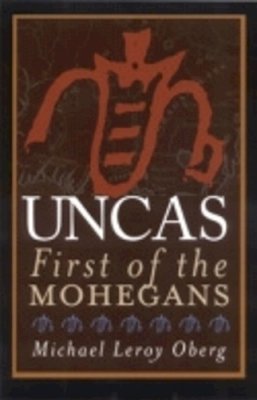
Uncas: First of the Mohegans
Michael Leroy Oberg
Many know the name Uncas only from James Fenimore Cooper's The Last of the Mohicans, but the historical Uncas flourished as an important leader of the Mohegan people in seventeenth-century Connecticut. In Uncas: First of the Mohegans, Michael Leroy Oberg integrates the life story of an important Native American sachem into the broader story of European settlement in America. The arrival of the English in Connecticut in the 1630s upset the established balance among the region's native groups and brought rapid economic and social change. Oberg argues that Uncas's methodical and sustained strategies for adapting to these changes made him the most influential Native American leader in colonial New England.
Emerging from the damage wrought by epidemic disease and English violence, Uncas transformed the Mohegans from a small community along the banks of the Thames River in Connecticut into a regional power in southern New England. Uncas learned quickly how to negotiate between cultures in the conflicts that developed as natives and newcomers, Indians and English, maneuvered for access to and control of frontier resources. With English assistance, Uncas survived numerous assaults and plots hatched by his native rivals.
Unique among Indian leaders in early America, Uncas maintained his power over large numbers of tributary and other native communities in the region, lived a long life, and died a peaceful death (without converting to Christianity) in his people's traditional homeland. Oberg finds that although the colonists considered Uncas "a friend to the English," he was first and foremost an assertive guardian of Mohegan interests.
Product Details
About Michael Leroy Oberg
Reviews for Uncas: First of the Mohegans
William B. Hart, Middlebury College
The Journal of American History
Oberg has composed what is clearly the most comprehensive and strongest treatment of Uncas thus far.... The author has successfully employed the framework of ethnohistory to construct a balanced and contextualized interpretation of Uncas' life, something that has been heretofore elusive. The Uncas that emerges from Oberg's pages is neither a bronzed hero of English providence, nor a convenient straw man who can be battered in the name of white guilt over and justification for imperial conquests.
Akim D. Reinhardt, Towson University
Journal of Colonialism and Colonial History
